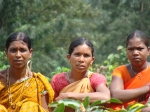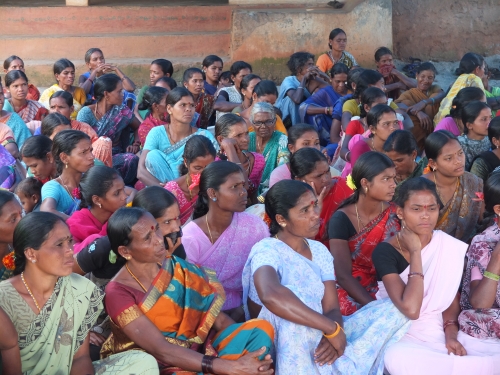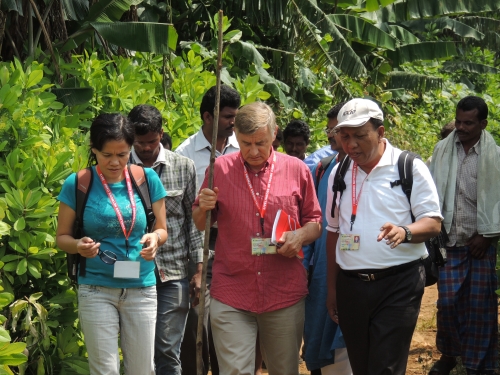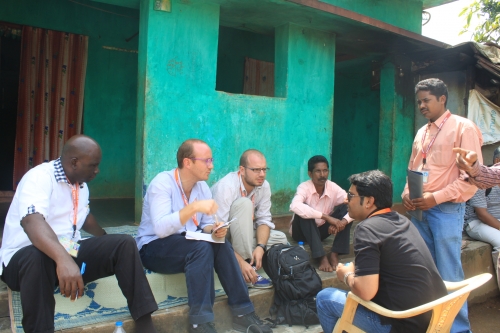Why was the Livelihoods Network Camp so special?
 140 people from 21 countries in Africa, Asia, America and Europe representing 61 organizations as being submerged for four days at Araku, a village in Andhra Pradesh, India. At first glance, the place that hosted the first edition of the Livelihoods Network Camp, from 8 to 10 October 2012, may be surprising. But this choice is in line with the philosophy of the Livelihoods Fund, which aims to combine carbon finance and the fight against poverty. “Local people must remain central to our ambition,” explains Bernard Giraud, President of Livelihoods Venture.
140 people from 21 countries in Africa, Asia, America and Europe representing 61 organizations as being submerged for four days at Araku, a village in Andhra Pradesh, India. At first glance, the place that hosted the first edition of the Livelihoods Network Camp, from 8 to 10 October 2012, may be surprising. But this choice is in line with the philosophy of the Livelihoods Fund, which aims to combine carbon finance and the fight against poverty. “Local people must remain central to our ambition,” explains Bernard Giraud, President of Livelihoods Venture.
Managers and leaders of NGOs, of private companies, public institutions and experts, projects funded or not by the Livelihoods Fund, the “campers” had the objective to share knowledge and good practices, learn from feedback from local people and offer “solutions” to the test of reality of the Araku inhabitants, the “adivasis”, one of the first peoples of India. Naandi Foundation, a Livelihoods partner, has been active for a decade with “adivasis” and leads, hand in hand with local people, an agroforestry project (four years of planting 6,000 ha of fruit trees, timber and coffee).

Always willing, always ready to understand and to participate to the discussions
Indeed, the Livelihoods Network Camp has been designed around an original concept, the “learning by doing”, which is organized in a practical way as follows: a half-day contact with adivasis families to identify their needs and expectations, and another half day to share the results of visits and build together the answers to the challenges identified. “I will return to my country to tell my people that I saw in India, people like them. And tell them that by working in a collaborative manner, to the construction of solutions to the challenges faced by the adivasis people, I felt thinking for my people too, “responded Ini Damien, President of the Association for the Advancement of Women of Gaoua in south-western Burkina Faso.
Livelihoods Network Camp participants focused this year their observations and reflections on six specific areas: monitoring project carbon market access for thousands of farmers who inhabit the region, strengthening their capacities and access to finance, access to energy, improved nutrition and the health of farmers and their families.

“Nutrition group” members :” how to improve child nutrition taking into account the culture, and habits…”
The Livelihoods Network Camp 2012 brought together in Araku, “regulars” of the field, but also representatives of private companies involved in the fund. For example, Joël Lelostec from Schneider Electric is involved in the group “access to energy” whose objective was to identify renewable energy technologies most appropriate to the context and to study the implementation of viable business models in the field of energy for the population. “Our investment goes beyond the financial sphere. We want to put our practical skills, our expertise in concrete service projects and thus serving the people” he explained, during a ceremony where a few solar lights were given in one of the villages visited. Within the group “Nutrition” skills from Danone have been working on the causes of malnutrition of half children aged 0 to 36 months in Araku region where climatic conditions and agricultural production may yet be better utilized.
On their side, experts from Crédit Agricole investor in the Livelihoods Fund, worked on the crucial topic of access to finance.
Co-constructing a process that has a future with the Livelihoods Network
Solutions were outlined at the end of the Livelihoods Network Camp, on the basis of observations, starting questions, findings and difficulties presented by the Naandi Foundation – event host – who worked for several years in the region. They will continue to be refined, in particular to be translated or adapted elsewhere. “I learned from everything I saw and heard, I met amazing people, and I sincerely hope to continue the approach adopted,” said Alou Keita, president of CAMIDE (Support Centre for Microfinance and Development), from Mali, who was in the group “Access to Finance”. It is in any case a real physical network that was built during these few days, using an innovative method of co-construction: the ‘learning by doing’; a method that will be certainly deepened through the Livelihoods Network.

Smooth running of the co-construction process with the “Access to market” working group
© Photos : Julie Vincent / Guillaume Bouculat / Maureen Ravily / Mariem Ben Abid

